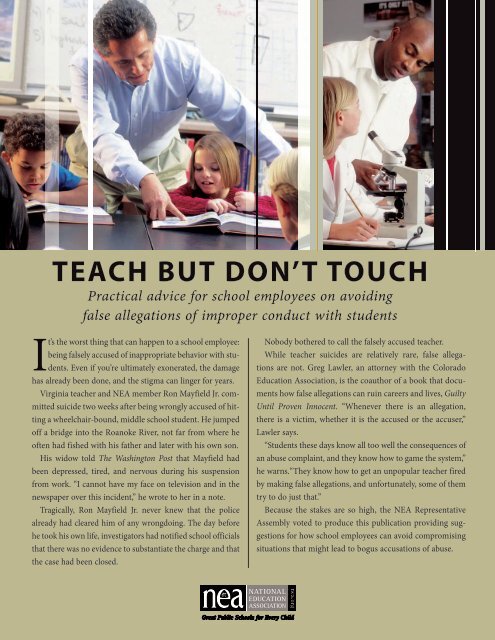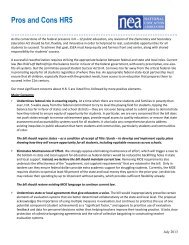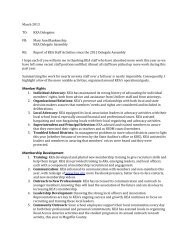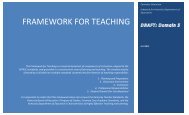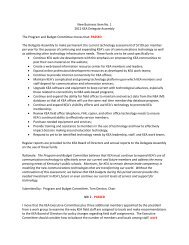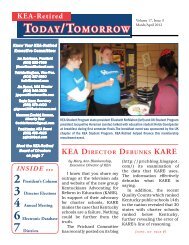Teach BuT Don'T Touch
Teach BuT Don'T Touch
Teach BuT Don'T Touch
Create successful ePaper yourself
Turn your PDF publications into a flip-book with our unique Google optimized e-Paper software.
<strong>Teach</strong> But Don’t <strong>Touch</strong>Practical advice for school employees on avoidingfalse allegations of improper conduct with studentsIt’s the worst thing that can happen to a school employee:being falsely accused of inappropriate behavior with students.Even if you’re ultimately exonerated, the damagehas already been done, and the stigma can linger for years.Virginia teacher and NEA member Ron Mayfield Jr. committedsuicide two weeks after being wrongly accused of hittinga wheelchair-bound, middle school student. He jumpedoff a bridge into the Roanoke River, not far from where heoften had fished with his father and later with his own son.His widow told The Washington Post that Mayfield hadbeen depressed, tired, and nervous during his suspensionfrom work. “I cannot have my face on television and in thenewspaper over this incident,” he wrote to her in a note.Tragically, Ron Mayfield Jr. never knew that the policealready had cleared him of any wrongdoing. The day beforehe took his own life, investigators had notified school officialsthat there was no evidence to substantiate the charge and thatthe case had been closed.Nobody bothered to call the falsely accused teacher.While teacher suicides are relatively rare, false allegationsare not. Greg Lawler, an attorney with the ColoradoEducation Association, is the coauthor of a book that documentshow false allegations can ruin careers and lives, GuiltyUntil Proven Innocent. “Whenever there is an allegation,there is a victim, whether it is the accused or the accuser,”Lawler says.“Students these days know all too well the consequences ofan abuse complaint, and they know how to game the system,”he warns.“They know how to get an unpopular teacher firedby making false allegations, and unfortunately, some of themtry to do just that.”Because the stakes are so high, the NEA RepresentativeAssembly voted to produce this publication providing suggestionsfor how school employees can avoid compromisingsituations that might lead to bogus accusations of abuse.
commonsense pointers for avoiding false allegationsWhenever possible, never be alone with a student.That’s because a student’s allegations made when there areno other witnesses hinge on credibility, and authorities oftentend to favor the alleged victim in these circumstances. Sodon’t be alone with a student in a house or a car, and nevergive a student a ride home. To the extent possible, avoid beingalone with a student in a classroom.Risky situations include: one-on-one tutoring, counseling,after-school or recess detention, and make-up tests. If youcan’t avoid being alone with a student at school, keep the dooropen and stay in plain sight.Always maintain a professional demeanor and distance.That means: no flirting, teasing, or joking about sex. Don’tsocialize with students or treat them as “pals” or “friends.”Never give gifts, unless you give one to every student, anddon’t single out any one student for constant special attentionor flattery.Never send e-mails, text messages, or cards to studentsunrelated to schoolwork. Don’t ask students about their sociallives or comment on their personal appearance and avoid discussingintimate details of your own private life. Don’t hirestudents to babysit or allow them to visit your home. Be theadult and maintain boundaries.Avoid physical contact with students. This is a particularlydifficult area. Younger children often seek and need physicalcomfort from their teachers who, sadly, may be the only sourceof compassion and love that some students have. In the earlyelementary grades, an occasional hug is probably OK. But as ageneral rule, it’s best to avoid most forms of physical contact,especially kissing, hair stroking, tickling, and frontal hugging.And use common sense: a “high five” to acknowledge a jobwell done is fine; a slap on the bottom is not.Male teachers have to be especially careful when it comes tophysical contact of any sort. While a female teacher’s touch maybe perceived as comforting, a male teacher’s may be viewed assexually suggestive. And male employees are far more likelyto be accused of inappropriate contact with students thanfemale employees. According to one expert, accusationsinvolving female teachers and male students make up less than5 percent of the cases.Avoid using physical force to enforce discipline. Whenstudents are misbehaving or out of control, avoid touchingor grabbing them to get their attention. Instead, use verbalcommands and other disciplinary methods.There may be a rare occasion when you will have to usephysical force in self-defense or to prevent injury to others.If that happens, use the minimum force necessary to preventharm and immediately call for help. Also, if this is a persistentproblem, you may want to ask your district for specialtraining.Never allow a student to obsess over you. While a crushcan be flattering, it also can be fatal, so always nip it in thebud. An unfulfilled fantasy can result in a student acting outto gain attention or retaliating for being ignored. If a studentexpresses a love interest, respond with an unambiguous “no.”Don’t equivocate and certainly don’t encourage the student byacting pleased by the attention. It’s also advisable to share thisinformation with another adult and your Association representative.In some circumstances, it may be appropriate to tellyour supervisor and ask that the student be transferred.Be particularly wary of “troubled” students. This is atough one. Some students come to school with a host of emotionalneeds and chronic problems, and they may confidein their classroom teacher and ask for support and guidance.Particularly for a student with emotional problems,a teacher’s efforts to help unfortunately can be misconstruedas something more and may lead to an infatuation or dependence.Plus you don’t have the skills or training neededto assist.While you can and should express concern and compassion,don’t take on the role of confidant or counselor. Instead,refer the student to the school counselor, a trained professionalwho has both the expertise to assess what services thestudent may need and the experience to know how to arrangefor the delivery of those services to the student.Be especially vigilant if you hold certain teaching positions.Anecdotal evidence suggests that employees whoperform certain jobs are at increased risk of false allegations.These include athletic coaches and performing arts teachers—drama, band, chorus, and debate, as well as publicationsadvisers. This trend may be the product of the intense natureof such activities, which may weaken teacher/student boundaries,coupled with a substantial amount of after-school,weekend, and off-campus contact.This publication was prepared by Michael D. Simpson, NEA Officeof General Counsel, with input and assistance from attorneys fornumerous NEA state affiliates.September 2006
But that can’t happen to me…Facing down false accusationsOne student, one accusation, and a teacher’s life is changed forever.By Michael GallagherE-mail: Galla17@aol.comNEA member Michael Gallagher taught elementary schoolin Abington, Pa., for 25 years until he was falsely accused ofsexual molestation and rape. After a nine-month nightmare,he was fully exonerated. He has since retired with full benefits.This is his story.When I answered the door that cold, dismal morningin December, I faced two detectives from the policedepartment.“Are you Michael Gallagher?” one asked.“Yes.”“Someone’s filed a complaint against you, and we want you tocome to the station with us.” Confused and dazed, I asked if Ishould call a lawyer.“No,” they said, so I didn’t. That was my first big mistake.At the station, my wife and I were put in separate rooms. Bothof us were questioned.I was told that a student I taught 12 years ago had accused meof sexually molesting her, raping her 20 times.I was flabbergasted! Who would make such an accusation?The police named a girl in my fifth-grade class in 1985. I couldn’treally place her. That had been a good class, and only a few studentsstood out.I’ve taught more than 800 students in my 25 years in the classroom.Why had this one made such a false accusation about me?I went into teaching to help children, not harm them.I answered the detectives’ questions, permitted them to searchmy house, and even took a polygraph. These were all big mistakeson my part.When I was released after seven grueling hours, I finally usedmy common sense and called my Pennsylvania State EducationAssociation attorney. Upset that I’d waited so long to call, hemade quick plans to represent me.Incredibly, a month later, on January 22, 1998, I was arrestedand placed in a cell for three hours before my bail arraignment.To my surprise and horror, every television camera in theDelaware Valley filmed me, in handcuffs, accompanied by twouniformed officers, walking into the courthouse.With little formality, the judge set a preliminary hearing dateand bail, and I was released on my own recognizance — with onecondition. I could have no contact with children whatsoever.Here I was, a well respected teacher and a law-abiding citizen,being treated as a pedophile!The school board suspended me immediately without pay. Ithen began the longest journey of my life, aided by the unendingsupport of my entire family, district teachers, and friends.Phyllis “Honey” Pertnoy, my local Association president,wouldn’t rest until I was proven innocent.She raised much needed money, spoke in my defense all overthe country, and pledged to be a character witness. It made meproud to be an NEA member.While waiting for trial, the state attempted to remove myteaching certification. The notice stated that an indictment orarrest was, in effect, as good as a conviction.What few rights teachers really have, I thought. How much weneed our Association to fight for us.Finally, in October, an assistant district attorney, at our urging,questioned my accuser again. The young woman contradictedher earlier testimony and failed a polygraph test. She had liedabout everything.A few days later, at a news conference, the district attorney’soffice announced my total exoneration. The media—from localnewspapers to Dateline NBC—picked up the story.Could such a tragedy happen to you? I’m hearing from peopleall over the country who, just like me, have been falsely accused.Here are some tips:• If accused by any law enforcement officer, never talk withoutan attorney. Don’t feel compelled to discuss your innocence.• If you are not under arrest, don’t go with the police—yourattorney can make these arrangements.• Talk with no one about the accusation except your attorneyand immediate family members.• Be wary of any law enforcement agency. Most are ethical,some are not.• Always remember, there’s a tendency for administrators andpolice to believe the accuser, not you.• Above all, be cautious. I wasn’t.Reprinted from the May 1999 NEA Today
What to Do if the Unthinkable HappensEven if you follow the advice in this publication, there’sno guarantee that you won’t be the victim of false allegations.And if that happens, here are some suggestionsabout what to do and what not to do:• First, call your Association representative. Dependingon the local, that person may be a building representative,the Association president, or a UniServ director.Your Association representative can provide adviceand help you obtain legal representation under variousAssociation programs. (See “Did you know…” below.)• Don’t talk to school administrators or law enforcementofficers. Even innocent statements can be misconstruedand misused. The decision whether to meetwith these officials and what, if anything, to say tothem should be made only after consulting with yourlegal and/or other Association representative. In mostcircumstances, your representative should accompanyyou to any meeting.• Don’t sign anything. It goes without saying that thiswill be an enormously stressful time, and you shouldnot make any decision about signing a statement orother document without first discussing it with yourrepresentative.• Don’t talk to the media, unless and until you and yourrepresentative decide that it is in your best interest todo so.• Don’t resign from your job. No matter how badthings look, resigning will not help, and it may beinterpreted as an admission of guilt. You should notconsider this option until you have consulted withyour representative.Did you know.…One of the benefits provided by NEA and your stateAssociation is job rights protection under the KateFrank/DuShane Unified Legal Services Program(ULSP). The ULSP is a jointly sponsored NEA and state affiliateprogram that provides appropriate legal assistance to memberswho are subjected to discipline or discharge by their employer.But did you also know that NEA provides two other importantbenefits that may be available to members who are falsely accused?Some cases involving very serious allegations can result in criminalcharges being filed against you and may require you to retaina criminal defense attorney. If the charges arise in the course ofyour employment and you are fully exonerated or all the chargesare dropped, then the NEA Educators Employment Liability (EEL)Program will reimburse you up to $35,000 for attorneys’ fees.(Note: If the criminal charges are limited to corporal punishment,there is reimbursement even if you are not exonerated.)Be sure to contact your state Association before retaining acriminal defense attorney. Your state Association may be able torecommend a reputable attorney who has experience with childabuse cases.You also might be sued for damages by the alleged victimand/or the parents. Under the EEL Program, all NEA membersare covered for claims up to $1 million in civil lawsuits againstthem for damages and attorneys’ fees arising out of their employmentactivities. The policy kicks in after any insurance availablethrough the school district, and is subject to several exclusions.Check with your state Association for additional informationabout the scope of coverage under the EEL Program.1201 16th St., N.W. | Washington, DC 20036© 2006 by the National Education Association.All rights reserved. NEA state and local affiliatesare granted an express license to reprint anddistribute copies of this publication.


